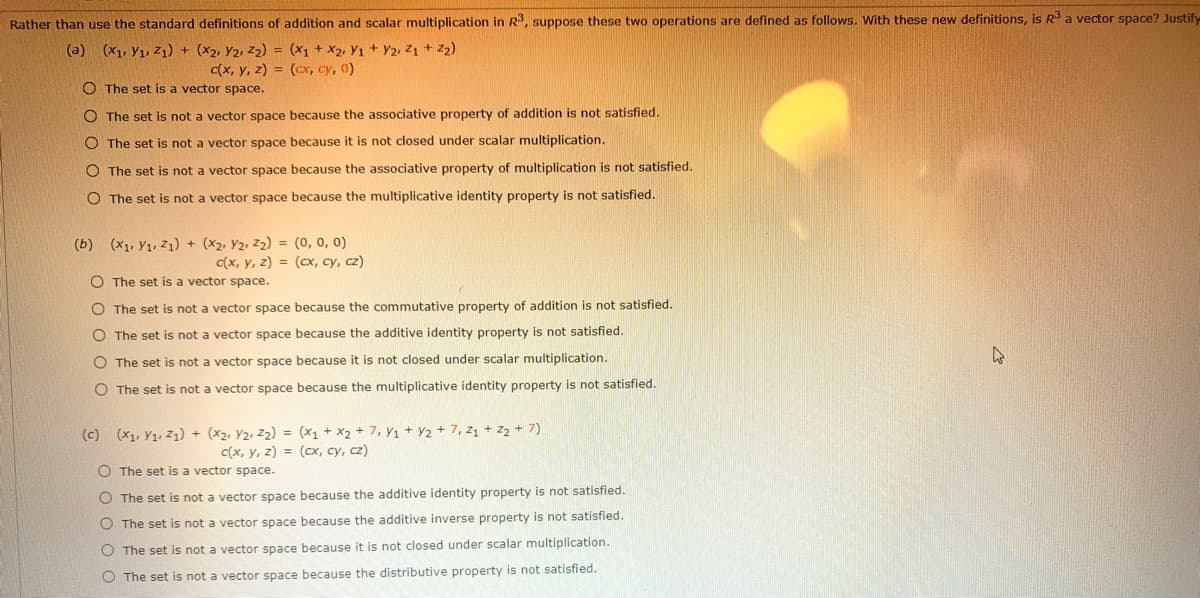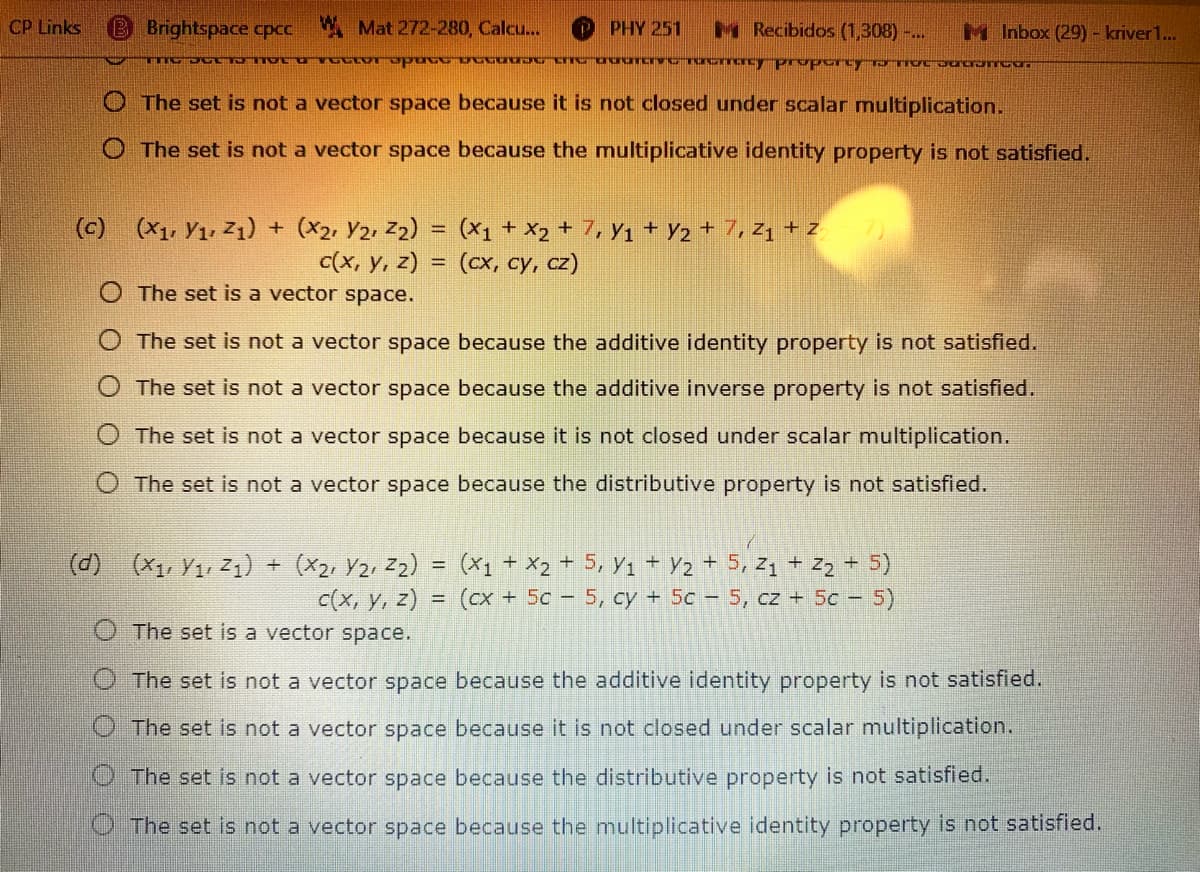Rather than use the standard definitions of addition and scalar multiplication in R, suppose these two operations are defined as follows. With these new definitions, is R a vector space? Justif (a) (x1, Y1, Z1) + (x2, Y2, Z2) = (X1 + X2, Y1 + Y2, Zı + Z2) c(x, y, z) = (cx, cy, 0) O The set is a vector space. O The set is not a vector space because the associative property of addition is not satisfied. O The set is not a vector space because it is not closed under scalar multiplication. O The set is not a vector space because the associative property of multiplication is not satisfied. O The set is not a vector space because the multiplicative identity property is not satisfied. (b) (x1, Y1, Z1) + (x2, Y2, z2) = (0, 0, 0) C(x, y, z) = (cx, cy, cz) O The set is a vector space. O The set is not a vector space because the commutative property of addition is not satisfied. O The set is not a vector space because the additive identity property is not satisfied. O The set is not a vector space because it is not closed under scalar multiplication. O The set is not a vector space because the multiplicative identity property is not satisfied. (c) (x1, Y1, Z1) + (x2, Y2, Z2) = (x1 + X2 + 7, y1 + Y2 + 7, z1 + z2 + 7) c(x, y, z) = (cx, cy, cz) O The set is a vector space. O The set is not a vector space because the additive identity property is not satisfied. O The set is not a vector space because the additive inverse property is not satisfied. O The set is not a vector space because it is not closed under scalar multiplication. O The set is not a vector space because the distributive property is not satisfied.
Rather than use the standard definitions of addition and scalar multiplication in R, suppose these two operations are defined as follows. With these new definitions, is R a vector space? Justif (a) (x1, Y1, Z1) + (x2, Y2, Z2) = (X1 + X2, Y1 + Y2, Zı + Z2) c(x, y, z) = (cx, cy, 0) O The set is a vector space. O The set is not a vector space because the associative property of addition is not satisfied. O The set is not a vector space because it is not closed under scalar multiplication. O The set is not a vector space because the associative property of multiplication is not satisfied. O The set is not a vector space because the multiplicative identity property is not satisfied. (b) (x1, Y1, Z1) + (x2, Y2, z2) = (0, 0, 0) C(x, y, z) = (cx, cy, cz) O The set is a vector space. O The set is not a vector space because the commutative property of addition is not satisfied. O The set is not a vector space because the additive identity property is not satisfied. O The set is not a vector space because it is not closed under scalar multiplication. O The set is not a vector space because the multiplicative identity property is not satisfied. (c) (x1, Y1, Z1) + (x2, Y2, Z2) = (x1 + X2 + 7, y1 + Y2 + 7, z1 + z2 + 7) c(x, y, z) = (cx, cy, cz) O The set is a vector space. O The set is not a vector space because the additive identity property is not satisfied. O The set is not a vector space because the additive inverse property is not satisfied. O The set is not a vector space because it is not closed under scalar multiplication. O The set is not a vector space because the distributive property is not satisfied.
Elementary Linear Algebra (MindTap Course List)
8th Edition
ISBN:9781305658004
Author:Ron Larson
Publisher:Ron Larson
Chapter4: Vector Spaces
Section4.2: Vector Spaces
Problem 42E: Rather than use the standard definitions of addition and scalar multiplication in R3, let these two...
Related questions
Question

Transcribed Image Text:Rather than use the standard definitions of addition and scalar multiplication in R3, suppose these two operations are defined as follows. With these new definitions, is R3 a vector space? Justify
(a) (x1, Y1, Z1) + (X2, Y2, Z2) = (X1 + X2, Y1 + Y2, Z1 + Z2)
c(x, y, z) = (cx, cy, 0)
O The set is a vector space.
O The set is not a vector space because the associative property of addition is not satisfied.
O The set is not a vector space because it is not closed under scalar multiplication.
O The set is not a vector space because the associative property of multiplication is not satisfied.
O The set is not a vector space because the multiplicative identity property is not satisfied.
(b) (x1, Y1, Z1) + (X2, Y2, Z2) = (0, 0, 0)
C(x, y, z) = (cx, cy, cz)
O The set is a vector space.
O The set is not a vector space because the commutative property of addition is not satisfied.
O The set is not a vector space because the additive identity property is not satisfied.
O The set is not a vector space because it is not closed under scalar multiplication.
O The set is not a vector space because the multiplicative identity property is not satisfied.
(c) (x1, Y1, Z1) + (x2, Y2, z2) = (x1 + X2 + 7, Y1 + Y2 + 7, z1 + z2 + 7)
C(x, y, z) = (cx, cy, cz)
O The set is a vector space.
O The set is not a vector space because the additive identity property is not satisfied.
O The set is not a vector space because the additive inverse property is not satisfied.
O The set is not a vector space because it is not closed under scalar multiplication.
O The set is not a vector space because the distributive property is not satisfied.

Transcribed Image Text:CP Links
B Brightspace cpcc Mat 272-280, Calcu...
PHY 251
M Recibidos (1,308) ..
M Inbox (29) - kriver1...
O The set is not a vector space because it is not closed under scalar multiplication.
O The set is not a vector space because the multiplicative identity property is not satisfied.
(X1, Y1, Z1) + (X2, Y2, Z2)
c(x, y, z)
The set is a vector space.
(c)
|(X1 + X2 + 7, Y1 + Y2 + 7, zı +Z
(сх, су, с2)
The set is not a vector space because the additive identity property is not satisfied.
The set is not a vector space because the additive inverse property is not satisfied.
The set is not a vector space because it is not closed under scalar multiplication.
O The set is not a vector space because the distributive property is not satisfied.
(x1, Y1, 21) + (X2, Y2, Z2) = (X1 + x2 + 5, y1 + Y2 + 5, z1 + Z2 + 5)
(cx + 5c - 5, cy + 5c - 5, cz + 5c – 5)
(d)
c(x, у, 2)
O The set is a vector space.
O The set is not a vector space because the additive identity property is not satisfied.
O The set is not a vector space because it is not closed under scalar multiplication.
The set is not a vector space because the distributive property is not satisfied.
O The set is not a vector space because the multiplicative identity property is not satisfied.
Expert Solution
This question has been solved!
Explore an expertly crafted, step-by-step solution for a thorough understanding of key concepts.
This is a popular solution!
Trending now
This is a popular solution!
Step by step
Solved in 4 steps

Knowledge Booster
Learn more about
Need a deep-dive on the concept behind this application? Look no further. Learn more about this topic, advanced-math and related others by exploring similar questions and additional content below.Recommended textbooks for you

Elementary Linear Algebra (MindTap Course List)
Algebra
ISBN:
9781305658004
Author:
Ron Larson
Publisher:
Cengage Learning

Linear Algebra: A Modern Introduction
Algebra
ISBN:
9781285463247
Author:
David Poole
Publisher:
Cengage Learning

Elementary Linear Algebra (MindTap Course List)
Algebra
ISBN:
9781305658004
Author:
Ron Larson
Publisher:
Cengage Learning

Linear Algebra: A Modern Introduction
Algebra
ISBN:
9781285463247
Author:
David Poole
Publisher:
Cengage Learning